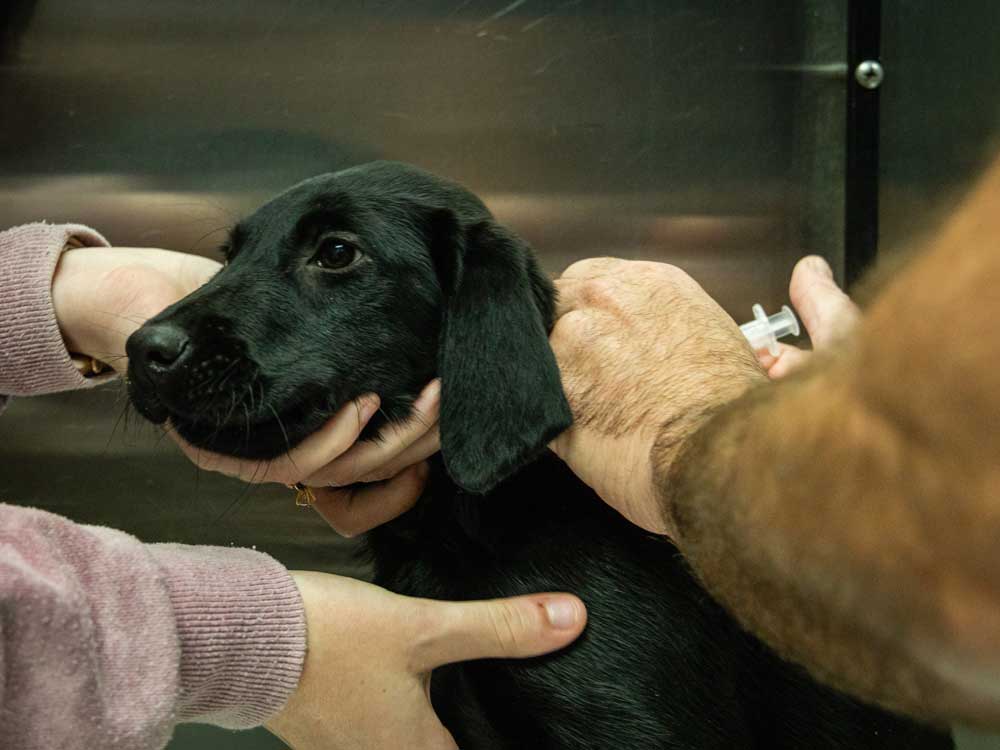Dr. Matt Ryan
As outdoors men and women, we tend to go “all in;” this is no different when committing to a new hunting and family companion. When considering adding a new pet to your family, scenes of early mornings and long days afield come to mind. You may imagine that next group of mallards breaking the treetops in Arkansas, a young lab hugging a tree by your side, or the adrenaline-filled rush of a pointer pup flushing pheasants for the first time in the grasslands of North Dakota. We spend more than our fair share of hours researching the perfect puppy from the best litter to make these dreams a reality. After choosing the perfect puppy, the next question is: What can we do to ensure these family friends and outdoor athletes stay as healthy as possible?

Lifelong maintenance starts at a very young age. When puppies are around six to eight weeks old, they will begin what is referred to as their “puppy shot” series of vaccines. These vaccines assist in preventing diseases such as parvovirus, distemper, coronavirus, parainfluenza, adenovirus, and leptospirosis. Depending on each state’s laws, your puppy should also receive a rabies vaccination once they reach a certain age. I encourage you to follow whichever puppy vaccination schedule your veterinarian recommends. I personally recommend puppies receive a “puppy shot” every three weeks until reaching 16 weeks of age. It is also imperative that you start your pet on heartworm preventatives, as well as flea and tick prevention, around six to eight weeks of age. After completing their final round of puppy shots, your pet will continue receiving vaccinations with their annual health checks.
Heartworm prevention is a very broad category, with plenty of options that can become very confusing. I encourage clients to approach preventions with as simple a plan as possible. For my clients, I tend to suggest one of two preventative plans for the life of their new companion. The first product I offer is an injectable form of heartworm prevention called ProHeart, which is the preventative I use for my own pets. ProHeart comes in a six-month or twelve-month dose. I choose to use it for the convenience aspect, as I do not have to remember to give a heartworm prevention every month. ProHeart can easily be paired with most monthly flea and tick preventatives for an effective prevention plan. The second product I encourage is called Simparica Trio. This is a product that is given orally every 30 days that is an all-in-one tablet that covers heartworm, flea, and tick prevention.

Once the puppy visits are complete, what can we do between check-ups to ensure our hunting partners stay as healthy as possible? As responsible pet owners, we should always strive to keep our pets within a healthy weight range. You would be surprised at the number of four-legged hunting companions that pack on a significant amount of “off-season” weight. Excess weight can predispose them to an increased risk of both orthopedic and endocrine diseases. There are several excellent body condition score (BCS) charts that can be found with a simple google search. Excess weight can be avoided by continuing to train and exercise your companions during the off-season, feeding a high-quality food, and ensuring we are not feeding an excessive amount of kibble and/or treats.

Top 3 Dangers to Dogs in the Field
Finally, what do we need to look out for to indicate we may need to be seen for an emergency or sick call appointment? The most common issues sporting breeds experience are foreign body or toxin ingestion, heat stroke, trauma (such as cuts and penetrating wounds), or gastric dilatation and volvulus (GDV) more commonly known as “Bloat.” The best way to approach these emergencies is to be prepared at home (which we will discuss in future articles) and to have a phone number for an emergency veterinary clinic in your local area.

Keep your dog as safe as possible during travel with a Gunner Kennel. You've invested time, money, and your heart into a dog--keep it protected.




























